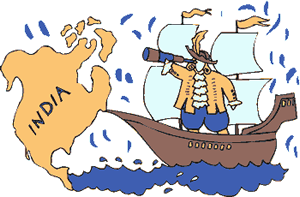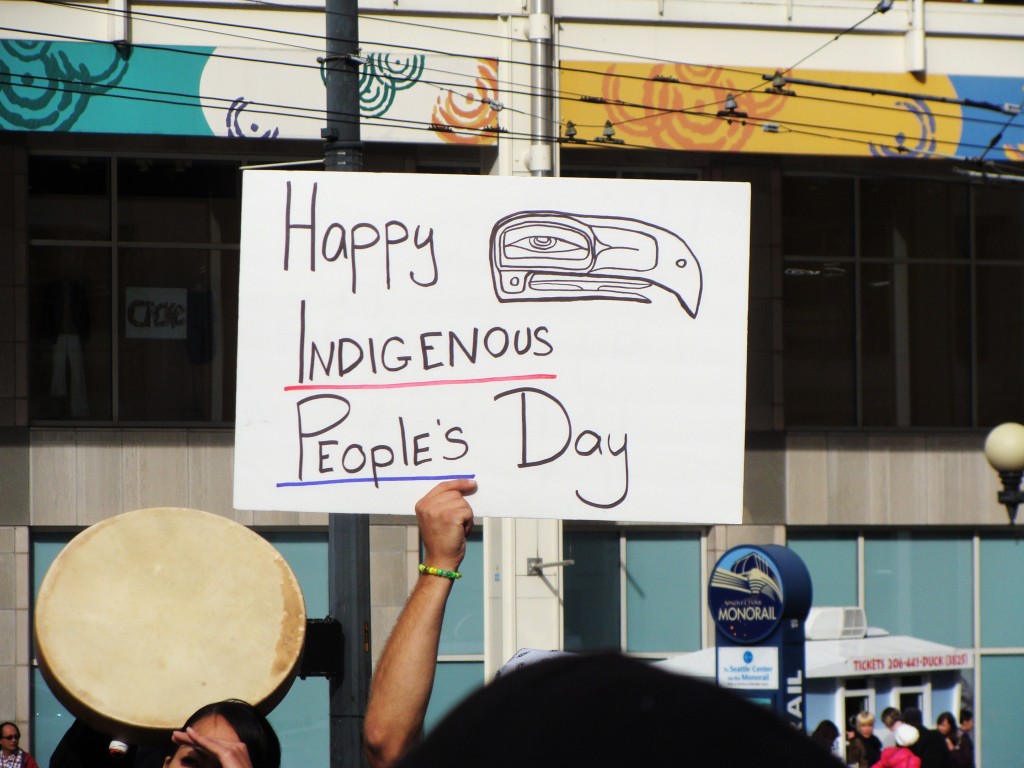

Let’s get a few things straight.
For starters, Chris Columbus didn’t discover jack squat.
Well actually, maybe he did.
He discovered a way to land on an island (already inhabited) some 12,000 miles away from where he originally wanted to go and still manage to get a holiday named after him. To put it in perspective, it would be like my dad leaving India in 1977, headed for America, and instead landing up in Japan, eating sushi and then claiming he discovered the hamburger — and then having McDonald’s honor him every year with a “Ram McDonald” statue.
You really can’t make this stuff up. I don’t know of any guy who can get that lost on his commute and still get that much credit. Can you imagine what would have happened if Columbus’ wife had been around during his trip and what she would’ve said to him if she had accompanied him? Could you imagine promising your wife that you’d take her to Tiffany & Co. to buy her a ring and then wind up at Chuck E. Cheese’s instead? You think Felipa would’ve let him slide on that one?
Her: “Um, where the hell are we?”
Him: “Honey, I swear this is it.”
Her: “Oh okay, because for a second, I thought we were lost.”
Yeah right. At the very least, Chris gets an award for hoodwinking everyone for this long. Not only for falsely believing he had discovered India, not only for getting credit for never finding it, not only for naming the indigenous people after a group he never met, not only for convincing school children like me that he somehow discovered the world was flat, but also for being a well-documented barbarian — cutting off the ears and noses of the indigenous people, enslaving them and raping them and then using their corpses as dog food. As The Oatmeal explains:
Despite all these awful shenanigans, Columbus still didn’t have enough gold, so he set up a tribute system whereby natives who brought him gold would receive a token to wear around their necks. This token gave them a sort of ‘get out of jail free’ card for a few months, so they wouldn’t be required to produce gold until the token expired. Any native without a token who was caught not meeting their gold quota was punished. The punishment? Instead of wearing a token around their neck, Columbus’s men would cut off the natives hands and force them to wear those instead.
And if you read his own journal entries, you will see how Chris really liked to view things. And yet, the
United States honors only two men with federal holidays bearing their names. In January we commemorate the birth of Martin Luther King, Jr., who struggled to lift the blinders of racial prejudice and to cut the remaining bonds of slavery in America. In October, we honor Christopher Columbus, who opened the Atlantic slave trade and launched one of the greatest waves of genocide known in history.
Sounds about right. (BTW, as I learned, Lincoln doesn’t actually have a federal holiday in his honor, nor is there one called “President’s Day,” contrary to popular belief).

At least most states around the country, and cities like Seattle, got it right, renaming today as ‘Indigenous People’s Day’ or just making it another Monday. Google, for example, displays no special banners on its search page in honor of the day that Chris landed on the wrong continent. And John Oliver offered a touching tribute in commemoration:
But what’s even more shocking is that even if Christopher had reached India, he probably still would have been honored — this time for discovering a more complicated way of doing a simple thing.
Chris: “I shall sail west to India.”
John II: “Ok, but it’s helluva lot faster to go around Africa.”
And that’s what the Portuguese did six years later in 1498, when Vasco da Gama (no less a blood-thirsty pirate) “discovered” India after sailing around the Cape of Good Hope and then proceeded to kill boatloads of pilgrims in later years.
After raids on several Muslim ports along the east African coast, da Gama began a campaign of terror against Muslim shipping off the Malabar Coast. Here he captured the Meri, a ship with 200 Muslim pilgrims on the return journey from Mecca, and set it [on fire]. With some 400 men, women and children aboard, da Gama fuelled the fires for four days until all had died. He then moved on to Calicut, where he captured and dismembered 30 fishermen and let their bodies float in with the tide for their families to find.
But regardless of whether Columbus reached India or not, it was pretty clear that some European nation would ultimately reach India and proceed to pillage it. It still troubles me today that Indians have to pay an admission ticket to walk into Buckingham Palace, coughing up all that money just to see all the showcased diamonds and stones and artifacts that were stolen from their ancestors. It’s like stealing the U.S. Constitution and then charging Americans to come see it in Delhi. (As I said before, and as I say again, if Britain won’t return the Koh-i-Noor diamond that it stole, then Indians ought to get free admission into Buckingham Palace. I’m just saying.)

Quite ironically, I was in a Goan spice market earlier this year when a very nice Portuguese couple was touring. I happened to hear the following conversation unfold:
Portuguese couple: “Oh, such beautiful spices, may we try?”
Indian shop owner: “Please, please, try.”
Portuguese couple: (Tasting what looked like mustard, then coughing) “Oh!! This is too spicy! No good!”
Indian shop owner: (To his son in Hindi) “Shocking! For hundreds of years, white people were hell-bent on sailing here and killing people and stealing these spices. Now they say it’s too spicy!”
I guess he had a point. If you killed for it, you better learn to like it!
But stealing spices and gold is one thing. Being the constant victims of identity theft is another, and Columbus is just one name in the long laundry list of people who have constantly renamed the term “Indians.” To be accurate, there is no Sanskrit word called “India” or “Indians” or even “Hindu.” The original word was “Sindhu,” a river in northwestern India and also the name of ancient India’s most early inhabitants, the Sindhu people. Because the ancient Persians could not pronounce the “s” (instead calling it “h”), the name “Sindhu” became “Hindu” and the land became known as “al-Hind” (instead of al-Sindh). The ancient Arabs, in turn, took the word “Hindus” to Europe and the Greeks dropped the “h” sound and called the river and its people “Indus,” which later derived into the word “India” used in English, and the Sindhu river is now known as the “Indus river”. So if you’re still keeping score, technically, the people Columbus called “Indians” were actually named after a river in northwestern India and, if history were even half-way accurate, Columbus would have called them “Sindhis.” Just a fun fact.
But even after this name transplant, “Indians” from “India” constantly have seen their names evolve, especially after moving to the U.S. Not only do they share the same wrong name with Native Americans, but when they started calling themselves Aryan (perhaps a more accurate historical name), they got jammed on that too. When they called themselves Asians, they were dubbed South Asians (as opposed to North Asians?).
In 1930 and 1940, Indian Americans were identified as a separate race, Hindu, and in 1950 and 1960 they were racially classified as Other Race, and then in 1970 they were classified as White. Since 1980, Indians and all other South Asians have been classified as part of the Asian race. Sociologist Madhulika Khandelwal described how “…as a result of activism, South Asians came to be included as ‘Asians’ in the census only in the 80’s. Prior to that many South Asians had been checking ‘Caucasian’ or ‘Other’…Unlike South Asians, Jewish Americans, Israeli Americans, Arab Americans, Iranian Americans and Central Asian Americans have not lobbied to be included as Asians by the U.S. Census Board.”
In the final analysis, Columbus Day for me will always be the day that I am asked to honor a man who did not discover the land of my ancestors.
Thank God(s). I’ll celebrate to that.